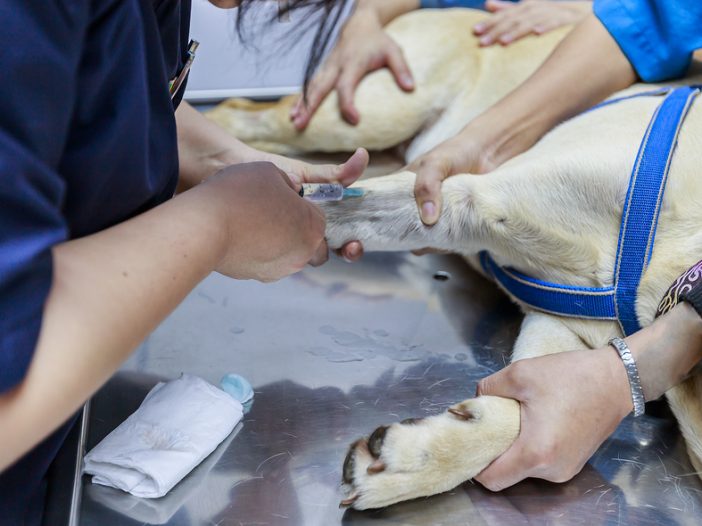
There was a point not very long ago when I thought I was ready to move on from veterinary medicine – at least the part about working in a clinic. I was moving out of state, so it seemed like the right time to look for new opportunities.
As it turned out, moving across the country was change enough for me, and as I was hunting for jobs I found myself seeking comfort in my professional knowledge. I started to apply for veterinary technician positions, and with that, came interviews. I remember walking into my first working interview after months of being out of a clinic and thinking, “what if I actually can’t do this?”
During my first working interview, a dog with marijuana toxicity came into the clinic. The doctor did an examination and induced vomiting. She talked me through what she was doing, and even though I knew well enough how a toxicity case is handled, I fumbled around clumsily grabbing towels and nodding my head. When the vomiting subsided, I was asked to place a catheter. Something I had done hundreds of times with ease. I reached around in drawers for tape, catheters, scrub, a t-port… and found none of what I knew. They used a different brand of catheters and there was no Elastikon to be seen.
At that moment I remembered hearing something about hiring new technicians and new graduate veterinarians. For many, their skills are limited to where they are comfortable working. Many may have only worked in one place their entire career or hadn’t taken their first job yet. This ran through my mind over and over again as I painfully realized I had worked in only one hospital for the last five years. I started as an assistant and made my way to becoming a certified veterinary technician. I learned how to place catheters, how to draw blood, how to monitor anesthesia and how to triage emergencies in one place. I knew that I only learned one way to do all of those things.
“Don’t panic,” I said to myself.
I then remembered a good piece of advice from a veterinarian at a conference. They said the first way to make friends at a new hospital is to follow the way their technicians place catheters. So, I took hold of the opportunity and I asked the lead technician. He told me how they would prepare the tape, how the needle snapped back into the cap of the catheter to reduce the risk of poking yourself, and where to find a t-port.
It was an ugly affair.
The catheter glided smoothly into the vein, but after that, nothing went according to plan. I fumbled with this new tape that stuck better to itself than to my patient. Again and again, it would stick uselessly and I would try again. After about 10 minutes, patience was wearing thin in all three of us and I resorted to cutting 4-inch Elastikon into 1 inch and taped the only way I knew how.
The working interview was over at that moment.
What good possibly came of that mortifying experience? At the time, a large milkshake from In-N-Out was about all. I felt terrible that this hospital brought me in for an interview, and I blew it. What did that say about me as a technician? It took some time, but I can see the good and the bad, not only the ugly when I look back on it.
I may have not succeeded at taping a catheter the way that hospital did, but I asked before I tried. I didn’t huff and puff and say I didn’t have what I needed. I showed something more personal in that interview, which was the willingness to learn new things and the respect to try their way. I also learned how valuable it is to diversify your techniques. When I finally did end up in a great hospital here in California, the first task I set myself to was to learn a new way to place a catheter. I now have a wider list of tools and skills at my disposal that I comfortably know how to use.
There’s a certain kind of pressure that comes with having experience. When I was applying for jobs as someone with no experience, begging for someone to take a chance, there were no expectations. Interviewing as someone who knows their stuff – that’s a whole different ball game. My takeaway was not to let my mistakes in an interview make me feel incapable. I’d been in the same hospital for five years! The important thing is learning to adapt with some time and support, and trusting yourself to try new ways of doing things.
The views and opinions expressed in this article are those of the author and do not necessarily reflect the position of the DrAndyRoark.com editorial team.